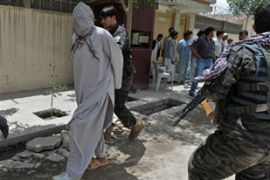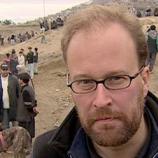Afghan jirga backs peace process
Conference calls for lasting peace with Taliban in bid to repair war-torn nation.

“Now the path is clear, the path that has been shown and chosen by you, we will go on that step-by-step and this path will Inshallah, take us to our destination.”
‘Abandon war’
Qiamuddin Kashaf, a deputy chairman of the jirga, said the proposed peace scheme would be among Afghans only and would “under no means involve foreign and regional terrorist groups”.
“Participants demand all involved in war … abandon war and brother-killing and, for a lasting peace in the country, accept peace and reconciliation,” he said.
But there were few signs that the Taliban, who have dismissed the jirga as a “phony reconciliation process,” were read to respond to the peace offer.
| FROM THE BLOGS | |||
|
The group has insisted that there can be no negotiations until all foreign troops leave Afghanistan and had warned delegates to stay away from the talks, saying that “the punishment for participating in the jirga is death”.
To start a peace process, the government should “draw up a broad-based programme as a permanent and national strategy,” Kashaf said, adding “a powerful commission or peace shura (council) must be established”.
Tribal elders, clerics, politicians and members of the opposition who have renounced violence should be on the shura, which “must establish a committee for addressing the problems of the prisoners, their release and reintegration”.
Karzai had called the jirga to win national support for his plan to offer an amnesty, cash and job incentives to Taliban fighters while aranging asylum for top figures in a second country and getting their names struck off a UN and US blacklist.
James Bays, Al Jazeera’s correspondent in Kabul, said many of the proposals reached by the jirga will “please the Afghan government and the international committee”.
“But other proposals – such as the release of Taliban prisoners, closure of Guantanamo, Bagram and other jails, a timetable for the withdrawal of international troops – will cause some considerable alarm if they make into the final declaration of this jirga,” he said.
Fierce debate
About 1,600 delegates, who were divided into 28 sub-committees with about 50 people sitting on each committee, fiercely debated on Thursday whether anti-government leaders should be removed from the UN blacklist that freezes assets and bars overseas travel.
| in depth | |||||||||||||||
|
Others wanted US bounties on the heads of senior Taliban leaders to be lifted.
“We think some Taliban should be removed from the blacklist, but not everyone, not those at the very top,” Abdul Qader Kuchi, a delegate from Nangahar province in eastern Afghanistan, said.
Low-level Taliban members held by the US as enemy combatants at Bagram prison in Afghanistan and Guantanamo Bay, Cuba should be released, Kuchi said.
For its part, Washington offered cautious support for the jirga.
“There is no military solution to most conflicts. This is not unique in that regard,” Hillary Clinton, the US secretary of state, said on Thursday.
“But of course, we want to be kept fully informed.”
The US has around 100,000 troops in Afghanistan.
Several rockets were launched at the tent housing the jirga, during Karzai’s opening speech on Wednesday.
Long bursts of gunfire were also heard nearby. Karzai left the area in an armoured convoy after his speech.

